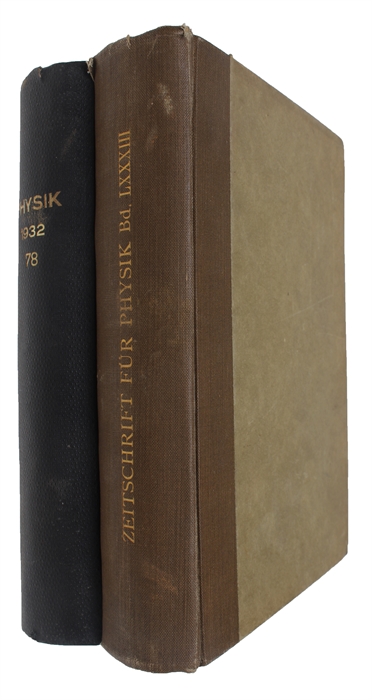"GOD DOES NOT PLAY DICE"
BORN, MAX.
Zur Quantenmechanik der Stossvorgänge. (On the Quantum Mechanics of Collision). (Vorläufige Mittheilung). + Quantenmechanik der Stossvorgänge. (Quantum Mechanics of Collision).
Berlin, Julius Springer, 1926. 8vo. In two contemporary half cloth bindings (not uniform). Gilt lettering to spine. In: "Zeitschrift für Physik", Bd. 37 & 38, 1926. Entire volumes offered. Vol. 38: Spine partly detached and with library stamp to free front and back end paper. Both volumes with a bit of soiling to extremities. Internally fine and clean.
First edition of these landmark papers in which Born formulated the now-standard interpretation of the Probability Interpretation of the Wave Function or Probability Density Function for psi*psi in the Schrödinger equation, for which he was awarded the Nobel Prize in 1954. It is considered to be one of the fundamental statements of modern physics and made Einstein famously state in a letter to Born in 1926: "Quantum mechanics is certainly imposing. But an inner voice tells me that it is not yet the real thing. The theory says a lot, but does not really bring us any closer to the secret of the 'old one'. I, at any rate, am convinced that He [god] is not playing at dice."
"Very soon after publication of Erwin Schrödinger's works on wave mechanics. Born recognized -despite Heisenherg's and Pauli's objections to its basic conceptions - that the new theory was acceptable from a mathematical point of view; and he used Schrödinger's method of treating atomic scattering processes. Applied to a standard scattering problem with known interaction-the scattering of a particle in an external field -the quantum theory permitted an exact calculation only in principle; except in special cases the basic differential equations could not be solved. With "Quantenme-chanik der Stossvorgänge" (1926) Born elaborated the basis of the "Born approximation method" for carrying out the actual computations; the method has since grown steadily in importance. Born’s works found worldwide recognition, and gifted young researchers flocked to work under him. The "Born school" at Göttingen was its important to the flowering of theoretical physics as the school of Bohr at Copenhagen and of Arnold Sommerfeld at Munich." (DSB).
"Born may not have realized at once the profundity of his contribution, which helped bring the quantum revolution to an end". (Pais, Inward Bound).
Order-nr.: 48979

